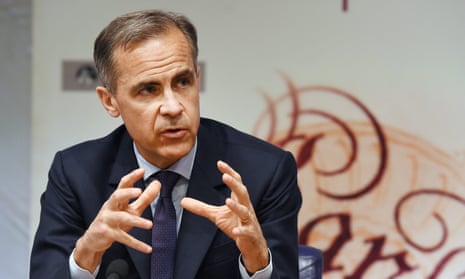The Bank of England governor, Mark Carney, has thrown his weight behind the fledgling market in green investments to help cut carbon emissions and boost global economic growth. Carney used a speech in Berlin on Thursday to highlight green finance as an opportunity to boost financial stability while also tackling climate change.
He said more of the $100 tn (£76tn) held by big global investment firms could be channelled into green bonds to help finance initiatives such as water or renewable power projects aimed at reducing carbon emissions. Last year, $42bn of green bonds were sold worldwide.
Carney made no reference to the Bank’s stance on UK interest rates, which were cut to a record low last month to shore up the post-referendum economy. He did, however, discuss the global picture of low interest rates and how more investment in green technologies and projects to cut emissions could help raise them.
“The Bank of England has long stressed that central bank policies are not the cause of low rates, but responses to them. We are actors in a play written by others,” Carney said.
That was because the level at which interest rates must ultimately settle to ensure steady inflation – the “equilibrium” interest rate – was determined by fundamental factors driving savings and investment in the global economy, he said. Those factors included technology, demographics and inequality.
Reprising his recent comments and those of other central bankers, Carney stressed that monetary policy alone could not address the world’s economic problems.
“Long-run prosperity was never in the gift of monetary policymakers. As the 10th anniversary of the start of the crisis approaches, a consensus is growing that escaping this low-growth low-inflation trap will require a rebalancing between monetary, fiscal and structural policies,” he said.
Carney voiced his support for structural reforms that encourage more private investment. He welcomed the Paris agreement on cutting carbon emissions and limiting the rise in global average temperatures, and called for a comprehensive climate policy framework within which companies would have enough information and certainty to make green investments.
He conceded that to make green finance more mainstream would require “a sweeping reallocation of resources and a technological revolution”, but also saw potential benefits for global interest rates.
“The International Energy Agency estimates that globally as much as €45tn [£39tn] of investment in total could be needed in power supply and end-use efficiency to meet the two-degree target agreed in Paris.
“China alone is likely to require around €500bn a year from 2016 to 2020 to finance its national environmental goals. A substantial proportion of this is likely to be raised offshore, absorbing excess global savings, helping to push up global equilibrium interest rates and ultimately increasing global growth.”
He called on the German government to take action when it assumes the presidency of the G20 group of countries next year.
“The upcoming German presidency of the G20 now has a historic chance to mainstream climate finance and turn risk into opportunity,” he said. “The G20 – whose members account for around 85% of global emissions – has a unique responsibility. The German presidency could be decisive.”

Comments (…)
Sign in or create your Guardian account to join the discussion